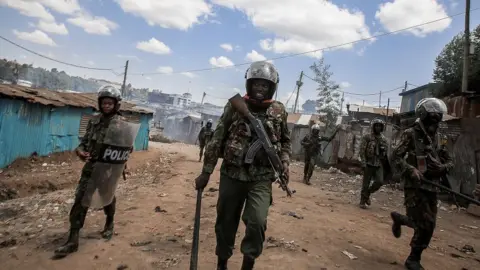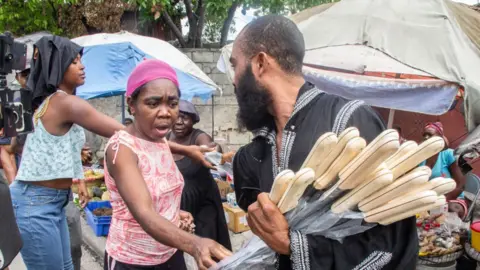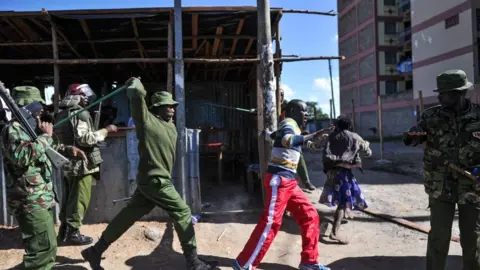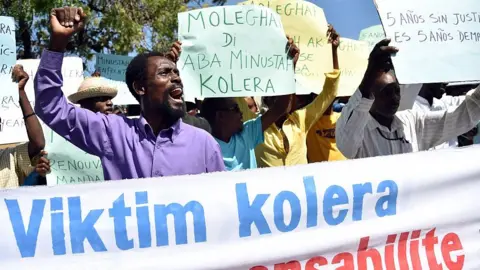Haiti crisis: Can Kenyan police officers defeat the gangs?
 Getty Images
Getty ImagesThe UN has backed Kenya's offer to lead a multinational security force in Haiti in response to a plea from the Caribbean nation's prime minister for help restoring order.
Haiti has suffered from gang violence for decades but the current wave of brutality escalated after the July 2021 assassination of President Jovenel Moïse.
Gangs have taken control of large parts of the country, waging terror on residents and killing hundreds.
UN Secretary-General António Guterres has said that a "robust use of force" is needed to disarm the gangs and restore order.
Greenlighting the deployment, the UN Security Council resolution approves the mission for a year with a review after nine months.
The new force will carry out joint security operations and will have the authority to make arrests in coordination with Haitian police, according to the resolution.
It will also aim to create conditions to hold elections. Haiti has not had an election since 2016.
Haiti's Foreign Minister Jean Victor Geneus called the decision "a glimmer of hope for the people that have for too long been suffering."
What has Kenya offered to do?
Kenya has said it would send 1,000 police officers to Haiti.
When this was first proposed in July, Kenyan officials said the officers would guard government buildings and infrastructure, but that plan changed after Kenya sent a fact-finding mission the following month.
The country now wants to deploy an intervention force that will neutralise the armed gangs, protect civilians and bring about peace, security and order.
Foreign Minister Alfred Mutua told the BBC that his country would also like to help Haiti rebuild vital infrastructure and establish a stable democratic government.
The Bahamas, Jamaica and Antigua and Barbuda have said they will take part in the mission and the minister added that Spain, Senegal and Chile were also likely to deploy security personnel.
Mr Mutua said he expected the force to be in place by the beginning of next year.
What will the Kenyan police find in Haiti?
Haiti is experiencing a multi-faceted security and humanitarian crisis that Mr Guterres called "a living nightmare".
Swathes of the mountain-cradled coastal capital Port-au-Prince - some estimates say 80% - are either controlled or regularly terrorised by heavily armed gangs.
These gangs, with names in Haitian creole such as "Kraze Barye" (Barrier-Crusher) and "Gran Grif" (Big Claw), have over the last two years been robbing, looting, extorting, kidnapping, raping and killing.
Armed with automatic weapons smuggled in mostly from the US, the gang members often out-gun the local police, sometimes burning their vehicles and stations.
They control, or regularly raid, the main routes in and out of the capital.
 Getty Images
Getty ImagesSimilar lawlessness plagues large areas of west and central Haiti, where roving "bandits", as locals call the gang members, invade and burn villages and towns.
The gangs have caused chaos and disrupted public services and the work of aid agencies, worsening poverty and health problems in a nation that was already the poorest in the Western Hemisphere.
What's in it for Kenya?
Mr Mutua has in part portrayed this as an altruistic offer.
"Haiti looked around and said: 'Kenya, please help us'. They did not ask any other countries. We have decided to do God's will and assist our brothers and sisters," Kenya's foreign minister said at a press conference.
However, Mr Mutua told the BBC that the intervention in Haiti would raise Kenya's global profile, which could benefit the country.
Some commentators have said Kenya is doing the US's bidding and is hoping to curry favour with the global superpower.
The US has pledged to support the mission financially to the tune of $100m (£82m) - Canada has also offered funding.
On a recent visit to Kenya, US Defense Secretary Lloyd Austin signed a five-year security agreement and also said the US was "grateful to Kenya for its leadership in tackling security challenges in the region and around the world".
Are Kenya's police ready for this kind of mission?
Many critics have cast doubt on the ability of Kenyan police to take on Haiti's gangs.
They will need to come face-to-face with the armed gang members in unfamiliar terrain.
Nelson Koech, chairperson of parliament's defence committee, told Citizen TV that Kenya would not be sending traffic officers but "special armed forces" and that they would be fully trained before being deployed.
It is not clear which units will be sent to Haiti but it could be the paramilitary General Service Unit (GSU), which often responds to events like violent demonstrations and terrorist attacks.
Mr Mutua also said the government had been preparing for the deployment. He did not divulge any more details, other than saying that the authorities are currently providing French lessons to some of the officers to ease communication in Haiti.
The language barrier has raised some concerns, as in Haiti people predominantly speak French and Haitian Creole, while in Kenya, the most commonly spoken languages are English and Swahili.
How effective are Kenya's police?
Kenya's police officers have long been criticised for human rights abuses.
Several rights organisations have expressed worries about the ability of the officers to act humanely and responsibly in Haiti.
In an open letter to the UN Security Council in August, Amnesty International said it was concerned about the plan due to the Kenyan police's record of responding using excessive and unnecessary force.
The organisation said it had documented more than 30 cases of Kenyan police officers killing protesters through shootings and tear-gas suffocation during various protests this year.
Amnesty has also accused the police of beating protesters as well as unlawfully arresting and detaining them.
 AFP
AFPKenya's police chief Japhet Koome described the response of his officers to recent protests as "commendable".
He denied accusations of police killings and sensationally said that opposition politicians had planted bodies hired from mortuaries at protest scenes in order to pin the deaths on his personnel.
How have previous foreign interventions fared in Haiti?
Haiti, a former French Caribbean colony that became the world's first black republic at the start of the 19th Century after an epoch-making 1791 slave revolt, has a history of foreign interventions.
The US invaded and occupied Haiti from 1915 to 1934, sending in marines and military administrators.
Further US military interventions occurred in 1994 and 2004, to "defend democracy" and restore order.
The interventions made many Haitians wary of outside interference, especially involving the US.
 AFP
AFPPast UN peacekeeping deployments in Haiti, for example by the Brazilian-led Minustah force from 2004-2017, did not escape controversy either, when Nepalese troops were blamed for bringing in cholera after the devastating 2010 earthquake.
Even the massive US military-led foreign humanitarian intervention that responded to the quake, while certainly welcomed by many Haitians, raised sensitive debates about aid dependency and alleged abuses by some aid workers and peacekeepers.
Can Kenya succeed where others have failed?
Success will be measured by whether the Kenyan contingent can decisively defeat the crime gangs, restoring law and order to the daily lives of Haitians.
While Kenya's security forces have experience battling the al-Shabab Islamist militant group, and policing slum settlements, they will be on alien ground in Port-au-Prince's harbourside and hillside shantytowns.
Here, the armed gang members know their territories and are sometimes backed by local informers.
The Kenyans will need to work closely with the local Haitian police.
Help may also come from a grass-roots anti-gang vigilante movement known as "Bwa Kale" (Shaved Wood), which has killed several hundred gang members in recent months, often lynching and burning suspects in public.
But it may also pose a law and order challenge.
Kenya will need the logistical, equipment and intelligence support promised by the US and other governments.
What do Haitians think of the Kenyan offer?
Prime Minister Ariel Henry's government and its international partners, as well as the UN and most major aid organisations, have made clear their view that only a robust internationally backed security operation can restore normality in Haiti.
Inside Haiti however, views have been mixed.
They range from supporters of the force welcoming "our African brothers", to opposition groups that see Mr Henry - who took over as prime minister soon after the assassination of President Moïse - as a "de facto" illegitimate leader whose rule will be bolstered by the foreign intervention.
Some radical critics accuse the US and other Western governments of seeking to use the Kenyan soldiers to further "neo-colonial" and "imperialist" interests.
A notorious Haitian gang leader, former policeman Jimmy Cherizier, alias "Barbecue", has warned he will resist any foreign force if it seeks to keep Mr Henry in power.
One thing is clear - the Kenyan police officers, as they confront the gangs, will need to be careful to avoid innocent civilian casualties and also to win the "hearts and minds" battle too.
